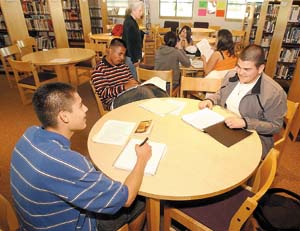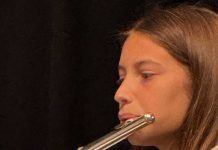
Many of us are familiar with
”
senioritis
”
– a debilitating disorder which causes many high school students
to find themselves unable to complete homework, pay attention in
class or even get out of bed in the morning in the months prior to
their graduation.
Many of us are familiar with “senioritis” – a debilitating disorder which causes many high school students to find themselves unable to complete homework, pay attention in class or even get out of bed in the morning in the months prior to their graduation.
For juniors and seniors at Anzar High School in San Juan Bautista, however, senioritis is simply not an option.
For nine years now, a pillar of Anzar’s curriculum has been the graduation exhibition, a program designed to demonstrate exactly how well students are able to put their high school education to use before they are allowed to graduate. And as the second semester begins with graduation only a few months away, many seniors are scrambling to complete a killer project before it’s too late, while juniors are working hard to get ahead before senior year.
“At worst, exhibitions are just more work for students to complete in order to graduate,” said Charlene McKowen, principal at Anzar High. “But at their best, which we really believe in, they ensure that every student graduating has really challenged him or herself in an area that they have a real passion for.”
Exhibitions are complex projects designed to integrate several academic disciplines into one broad issue the student takes a particular interest in. Students cover language arts, science, service learning or volunteer work, social sciences, a post-graduate plan and math, if the student chooses. Students complete at least one but no more than three exhibitions, and most choose to split up the requirements into two projects.
Art, world languages and possibly math must be used in at least one exhibition, and each project has a written component, an oral presentation and a question and answer session judged by a panel selected from the community.
“Generally the students view these as semester-long projects,” said McKowen. “But sometimes they’ll decide to incorporate all areas at once and get an extension. It’s pretty impressive.”
Though the exhibitions require a definite time commitment in and out of class, the program is a boon to students looking to further their education after high school – not only does it prepare students for more advanced work, educators say that college admissions officers love to see a program like Anzar’s on a prospective student’s resume, which gives them an edge over the competition. And though the nearly 200 students who participate each year may not enjoy every minute of preparing their exhibitions, the benefits are not lost on them.
“It’s a little hard to get into at first,” said junior Emily Cassel, who is currently working on an exhibition exploring Turret’s syndrome. “But when you go to apply for college you already have your foot in the door. In the long run, I think we have a huge advantage.”
Cassel was inspired to pursue her exhibition this year by her father, who lives with the affliction and is “totally comfortable” discussing the matter with his daughter, as well as pointing her in the right direction for her research. Not only is Cassel approaching the issue from a psychological standpoint, which she is considering studying in college, but is currently delving through literature to explore how the syndrome has been portrayed in art and fiction throughout the decades.
“Since my dad has it, it’s always interested me,” she said. “And since we have all this time to work on our projects, it’s a good excuse to learn about something you like that you’ll put to use one day.
Anzar provides an elective course, which sets aside a class period almost every day for students to determine what exactly their passion is and how best to tackle it, with the direction of a teacher. Students often choose to seek additional support from other teachers they have grown close to, to the extent that every instructor at the school is involved with the exhibitions at some level, says McKowen.
“When else do you have the opportunity to really devote yourself to your passions in the classroom every day?” she said.
Many of the students choose topics close to them or that affect friends or family, and many explore subjects directly related to their intended major or career field, or choose to elaborate upon lessons learned during Anzar’s intersession period. Issues broached range from domestic abuse to the social ramifications of prostitution to massage to “The Da Vinci Code.”
While exhibition programs are still rare, an increasing number of high schools – usually small charter schools – are adding them to their list of graduation requirements, seeing the projects as a more effective gauge of skills than an exit exam and invaluable experience for college-bound seniors. Anzar was founded 12 years ago with a commitment to the idea of graduation exhibition, and by the time its first batch of seniors was ready to graduate, the model was in place and has been improved upon every year since.
“It’s really a cool idea, and a cool class,” said junior Sarah Chatley, whose exhibition focuses on the media’s portrayal of women. “It’s hard to get started, but having the time in class to work and hang out with your friends is a nice change from the other classes you take.”
Perhaps the greatest measure of the program’s success, says McKowen, is the number of students who find value in the experience after graduation.
“I get students coming back from college all the time asking for a copy of their papers,” she said. “They take them back to their dorm and share them with other students who are having a hard time tackling that first big college project. But our students are already comfortable with that level of thinking, and it’s great that they can bring that to the table in college.”
Danielle Smith covers education for the Free Lance. Reach her at 637-5566, ext. 336 or ds****@***********ws.com









